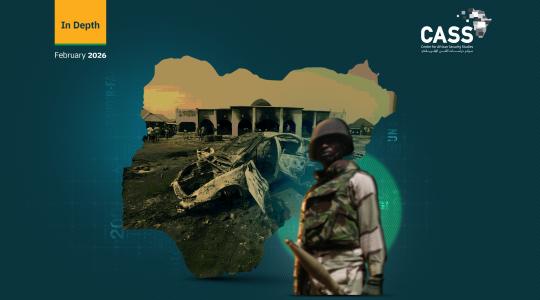On February 11, a gunman from Somalia’s Al-Shabaab jihadist group attacked the Gordon Military Base at Aden Adde International Airport in Mogadishu, killing at least nine soldiers. They included four Emirati officers and one from Bahrain, along with at least five members of Somali forces. The group claimed on its social media channels that the attack had killed a further eight Somali personnel, making a total of 17 casualties.
The attack was in retaliation for the United Arab Emirates’ backing of the Somali government’s battle against Al-Shabaab. In June 2023, the UAE had carried out a surprise drone strike targeting a meeting of senior Al-Shabaab figures, the Gulf state’s first attack against the Islamist militants. The strike, on a house in the town of Dumaaye in Shabaab-controlled Mudug State, came as government forces stepped up preparations for a military campaign that they subsequently launched in July 2023.
The Emirati attack prompted Al-Shabaab to carry out attacks against UAE-trained military units in Mogadishu, as well as assassinating several civilians accused of cooperating with them. This campaign included a September 2023 suicide attack at the Damanyo military camp in the Daynile district of the capital, where UAE-trained Somali commando forces are based. That attack killed about 20 troops and injured 30 others. Al-Shabaab now set its eyes on a bigger target: the most important Emirati base in Mogadishu.
The Trajectory of UAE-Somali Relations
The February attack demands a closer look at the trajectory of Emirati-Somali relations, which have fluctuated over the years between warmth, coolness and outright hostility. The UAE’s position on Somalia’s domestic affairs has tended to vary according to its relations with those in power.
The two governments’ relations set off on a positive footing in March 1993, when the United Nations launched the second phase of its peacekeeping intervention in Somalia. The UAE was one of several countries to participate, sending several battalions to help keep the peace in Mogadishu and providing thousands of tents to refugees fleeing the war. It also built a field hospital, which it later developed into the charitable Sheikh Zayed Hospital. The UAE subsequently continued backing charities and humanitarian organizations with financial grants and medical aid.
Abu Dhabi continued with this humanitarian support until the Gulf blockade of Qatar in 2017. The crisis in the Gulf had multiple knock-on effects for Somalia, most notably the suspension of an Emirati training program for Somali military units in Mogadishu in 2018. Somalia responded by confiscating $9.6 million from the Emirati ambassador’s plane in April of the same year, and voted to prevent Emirati logistics giant DP World from operating or developing ports in Somali. Then-Somali president Mohamed Abdullahi Farmaajo further demanded that the UAE apologize for its interference in Somalia’s internal affairs.
It was not until former president Hassan Sheikh Mohamud returned to power on May 15, 2022 that their relations slowly began returning to normal. The UAE signed new security deals with the army and the Somali government, including an agreement specifically focused on battling Al-Shabaab, as well as deals on exchanging intelligence on counter-terrorism and terror financing. They also reactivated a training and financing program for the Somali army. Mogadishu finally apologized for the previous government’s confiscation of Emirati funds and vowed to return the confiscated money, which the UAE subsequently returned, in the form of support for Somalia’s efforts to confront famine and drought.
The UAE’s Hidden Role in Somalia
Alongside its improved relations with the central government, the UAE has also developed its relations with Somalia’s separatist regions. Since 2010, the UAE has been backing the separatist administration of the Puntland region, funding the coast guard there to tackle piracy. It has also signed an agreement with the regional government for DP World to restore, develop and operate the port of Bosaso, directly across the Gulf of Aden from the UAE-controlled Yemeni port city of the same name, for 30 years. The UAE has also funded and trained the region’s intelligence agency.
The UAE has also built ties with the separatist—so far unrecognized—Republic of Somaliland. In 2016, it funded the breakaway region’s security services, and DP World has since signed an agreement with it to restore, develop and manage Somaliland’s main Berbera port for 30 years, as well as developing the city’s waterfront and its airport. The UAE is also financing and training the separatist republic’s coast guard, internal security apparatus, intelligence services, and army. It has also financed the construction of an international highway linking Berbera to Ethiopia through the western city of Wajali.
In January, the UAE supported an agreement the government of Somaliland reached with Addis Ababa to lease a 20-kilometer stretch of the region’s Red Sea coast, specifically the port of Berbera, to Ethiopia for a period of 50 years. The deal included several other important details, such as allowing the construction of an Ethiopian naval base at the port.
The UAE has also strengthened its own military presence on the ground in Somalia. It now has military bases at the port of Bosaso, the city of Alula, and a military airport at the port of Berbera. It is also building a base at the port of Kismayo, under a 2016 agreement with the federal government under then-president Hassan Sheikh Mohamud and then-regional governor of Jubaland Ahmed Mohamed Islam, to accommodate Emirati forces in the Jubaland region.
The Significance of the Gordon Base Attack
The UAE’s presence in Somalia is based on a strategic drive to control maritime transport hubs in the Horn of Africa, East Africa more generally and around the Indian Ocean. The Gulf state has invested directly in a long coastal strip starting from the Egypt port of Ein El Sokhna, south of the Suez Canal, and encompassing Hurghada, Sharm el-Sheikh, and West Port Said before reaching the Somali ports of Berbera, Bosaso, and Kismayo. The Gulf state has also invested in ports in Rwanda, Mozambique, Madagascar, Angola, Guinea, South Africa, Senegal, and the Democratic Republic of Congo. Abu Dhabi views the Horn of Africa as having particular strategic importance as it seeks to protect its influence in Yemen.
Accordingly, the UAE has worked to deepen its security and military alliances both with Somalia’s federal government and its various regional administrations. This resulted in the temporary transformation of the port of Berbera into a regional center for Emirati maritime services, as well as—theoretically—blocking the path of Iranian ships that had been docking in Bosaso on their way to smuggle weapons to the Houthis in Yemen.
In early February 2024 however, Somali President Hassan Sheikh Mohamud signed a law canceling the port deal, on the basis that it violated Somali sovereignty. He also threatened to a bitter fight against the agreement in order to protect the country. Despite this, he maintains a generally good relationship with the UAE—unlike his predecessor, who was openly hostile towards Abu Dhabi.
That said, the atmosphere remains charged and unstable, and the Al-Shabaab attack in February marked an unprecedented escalation by the jihadists. Notably, the attack made use of the perpetrator’s tribal ties, which had allowed him to infiltrate the army and wait, undetected, until the appropriate moment arrived to kill the highest-ranking Emirati officer in Somalia.
While the operation was an escalation, it was not the movement’s first operation against Emirati interests. In May 2018, Al-Shabaab shot dead DP World’s director of operations for the port of Bosaso, Maltese citizen Paul Anthony Formosa, at close range, as he walked around a fish market near the facility. As far back as June 2015, it targeted a relief convoy of the Emirates Red Crescent in Mogadishu with a suicide bombing, killing six Somalis working for the organization and wounding dozens of other people.
The movement’s operation against the Emirati officers also appears to have been in revenge for the killing of several Shabaab leaders in the 2023 Emirati drone strike, as well as in opposition to the UAE’s backing for Ethiopia’s access to the sea via Somaliland.
It is highly likely that the attack will push the UAE to step up its drone attacks against Al-Shabaab, as well as seeking to win over certain clans to form private militias to support government forces in their war against the organization. This would in turn exacerbate the security crisis in the country, and potentially create ideal conditions for a further escalation in jihadist activity.




